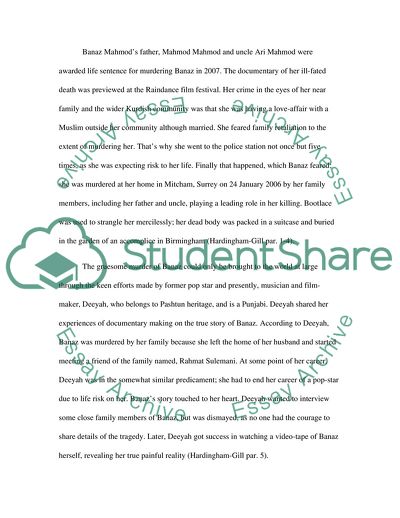Cite this document
(Discussion on Banaz Essay Example | Topics and Well Written Essays - 2500 words - 1, n.d.)
Discussion on Banaz Essay Example | Topics and Well Written Essays - 2500 words - 1. https://studentshare.org/history/1799080-discuss-one-historical-example-where-a-woman-or-girl-was-killed-by-other-members-of-her-family-in-a-manner-that-was-considered-legal-or-morally-correct-by-the-wider-society
Discussion on Banaz Essay Example | Topics and Well Written Essays - 2500 words - 1. https://studentshare.org/history/1799080-discuss-one-historical-example-where-a-woman-or-girl-was-killed-by-other-members-of-her-family-in-a-manner-that-was-considered-legal-or-morally-correct-by-the-wider-society
(Discussion on Banaz Essay Example | Topics and Well Written Essays - 2500 Words - 1)
Discussion on Banaz Essay Example | Topics and Well Written Essays - 2500 Words - 1. https://studentshare.org/history/1799080-discuss-one-historical-example-where-a-woman-or-girl-was-killed-by-other-members-of-her-family-in-a-manner-that-was-considered-legal-or-morally-correct-by-the-wider-society.
Discussion on Banaz Essay Example | Topics and Well Written Essays - 2500 Words - 1. https://studentshare.org/history/1799080-discuss-one-historical-example-where-a-woman-or-girl-was-killed-by-other-members-of-her-family-in-a-manner-that-was-considered-legal-or-morally-correct-by-the-wider-society.
“Discussion on Banaz Essay Example | Topics and Well Written Essays - 2500 Words - 1”. https://studentshare.org/history/1799080-discuss-one-historical-example-where-a-woman-or-girl-was-killed-by-other-members-of-her-family-in-a-manner-that-was-considered-legal-or-morally-correct-by-the-wider-society.


